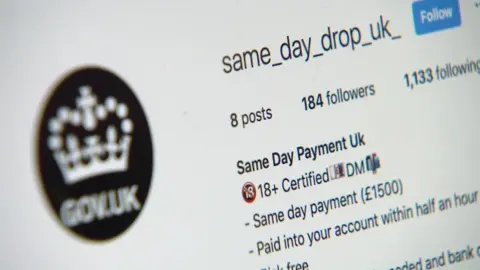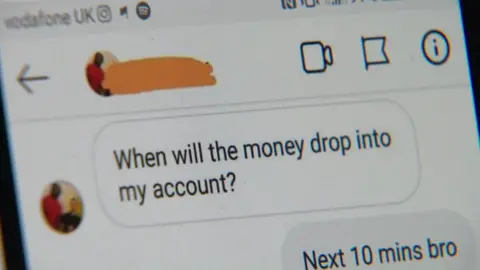Social media used by fraudsters to advertise benefit scam
 BBC
BBCFraudsters are using social media to promote a scam exploiting loopholes in the welfare benefit Universal Credit.
BBC News has found Facebook, Instagram and Snapchat pages plugging the scam, which can leave victims owing hundreds.
Separately, the BBC has been told that the homeless, drug users and even jobless young Britons in Spain are also becoming victims.
Ministers say they are working with social media sites to shut down accounts that promote fraud.
A spokesperson for Facebook said: "We do not allow fraudulent activity."
On Monday BBC News revealed that tens of millions of pounds are feared to have been stolen by fraudsters, exploiting a loophole in universal credit.
While many of those scammed have been approached directly, sometimes by people claiming to be from the job centre, we have now discovered a number of social media sites are promoting the scam.
On Facebook, the pages include Gov Grants Same Day, Same Day Grant, Discretionary Budgeting Grant and Same Day Grant Payment. Instagram sites include Same Day Drop UK, while Moneyinaminute is also advertising the fraud on Snapchat.
Some of the sites have been operating for months, with dozens of people contacting the fraudsters asking for details on how to get the "grants" or "free money" they are offering.

Sophie's story
Healthcare assistant Sophie Vickery, from Plymouth, says she was encouraged to apply for one of the "grants" after reading Facebook comments from people who had apparently already done it and were happy.
Sophie was initially cautious, but the people running the page assured her that she had nothing to lose if she went ahead.
She even asked if it was a loan and not a grant "and they said 'No. It's a government grant. You don't have to pay it back'."
When she eventually decided to go ahead she received the money within two hours.
"I got £1,200 and kept £600 and transferred the other £600 to them," she said.
She had been on tax credits but found herself moved on to universal credit, which she fears will make her worse off.
"I didn't really think much of it. It wasn't until the next day when I went to view my tax credits, I knew something was really wrong."
It quickly became clear that the person who had made the claim on her behalf had invented email addresses, given false answers to security questions and said she had five children, when she only has two.
She has made a fraud claim, but feels frightened and ashamed and fears she will have to pay back all the money.
"It was like I had fallen into a big black hole and I didn't know how to get out."
Give, Me, Some, Money, Now
The scammers have, in some cases, been taking as much as £1,000 from victims after secretly claiming £1,500 from universal credit on their behalf.
One bogus claim gave the names of five non-existent children as Give, Me, Some, Money, Now.
The BBC has also been told that scammers are targeting homeless hostels and drug users and young British workers in Ibiza who are between jobs.
Since our revelations on Monday, several officials from the Department for Work and Pensions (DWP) have been in touch, furious that the scam has been allowed to continue.
One told us: "Believe me when I tell you that £20m is nowhere near the truth. As front-line staff we have been pulling our hair out on this one for so long.
"At my job centre we are seeing between 15 and 20 false claims per day, each one scamming £1,500."

The staff member added that fraudsters came into their job centre several times a day with different people to open new claims with false information.
The DWP says it is aware of the fraud and has a team of 120 people looking to identify the culprits. Some senior officials admit they are as frustrated as the front-line staff at what is happening.
But another official told us: "There is an easy fix to this debacle.
"Allow and limit online universal credit advances to their standard allowance only - to cover immediate expenses - and exclude everything else, until the claimant comes into the office for the next part of the claims process where further verification can be done as required."
In a statement, a DWP spokesman said: "Sadly, criminals will always attempt to defraud the benefit system.
"The department is committed to bringing fraudsters to justice - last year we reclaimed more than £1.1bn in fraud and error and brought more than 5,000 prosecutions.
"We are already working with social media sites like Facebook to shut down accounts that promote fraud.
"Our dedicated team investigates all fraudulent advance claims referred to them, which represent less than 1% of all claims.
"Where there is clear evidence that people have been scammed out of money, they will not be asked to repay it."

Have you been a victim of a scam like this or been affected by this story? Share your experiences by emailing [email protected].
You can also contact us in the following ways:
- WhatsApp: +44 7756 165803
- Tweet: @BBC_HaveYourSay
- Send an SMS or MMS to 61124 or +44 7624 800 100
- Please read our terms and conditions and privacy policy
